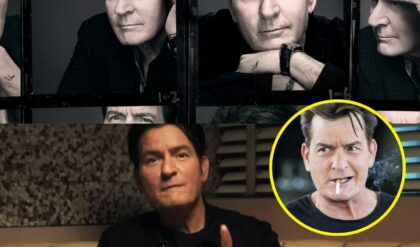The Unprecedented Fallout: A Network’s Retreat Under Pressure
The normally boisterous world of late-night television was plunged into an eerie silence this week as ABC made the stunning and unprecedented decision to indefinitely suspend “Jimmy Kimmel Live!”. The abrupt move came in the wake of a rapidly escalating firestorm surrounding comments made by the host about the tragic killing of conservative commentator Charlie Kirk. This is not just another network programming change; it is a seismic event that reveals the fragility of media independence in a hyper-partisan political climate. The suspension, a direct response to a coordinated pressure campaign from powerful media affiliates and a warning from the Federal Communications Commission (FCC), signals a chilling new era where comedy and commentary can be met with swift and decisive corporate action.
The controversy began innocuously enough, as Kimmel addressed the political fallout from Charlie Kirk’s assassination. During his monologue, he suggested that the “MAGA gang” was attempting to distance themselves from the accused killer. While intended as a political barb, his words unleashed a fury of backlash. A source close to the show revealed that Kimmel was prepared to address the controversy on his next broadcast, intending to clarify his remarks and show how they were taken out of context. Crucially, he did not believe an apology was warranted for what he considered an observation, not a misstatement. But in the current media landscape, a simple explanation was not enough. The narrative had already been set, and the wheels of a much larger machine were beginning to turn.
The Domino Effect: A Coordinated Revolt
The first crack in the foundation came from Nexstar, a media conglomerate that owns a massive portfolio of local television stations, including 28 ABC affiliates. In a powerful and unified statement, Nexstar announced it would preempt “Jimmy Kimmel Live!” from its airwaves indefinitely. The company’s President, Andrew Alford, minced no words, stating that Kimmel’s comments were “offensive and insensitive” and did not reflect the “values of the local communities” they serve. This was a critical first blow. Nexstar is not just any affiliate group; it is one of the largest in the country, and its public opposition created a ripple effect.
This was no isolated decision. The move by Nexstar was immediately followed by a chilling threat from the head of the Federal Communications Commission, Brendan Carr. In a highly unusual move for an FCC chairman, Carr went on a podcast and publicly floated the possibility of “license revocation” for stations that continued to air what he described as a “pattern of news distortion.” His message was clear: affiliate stations had an “obligation to serve the public interest” and should “push back on Disney programming” that they deemed falling short of community values. Carr’s words transformed the situation from a mere content dispute into a direct government warning. It put the immense power of a federal regulatory body behind the demands of the affiliate groups.
The pressure mounted as another major player, Sinclair, the largest owner of ABC affiliates, entered the fray. Sinclair went even further than Nexstar, not only pulling the show but demanding a direct apology from Kimmel to the Kirk family and a personal donation to Turning Point USA. They also announced that they would air a tribute to Kirk in Kimmel’s timeslot. This move was a clear statement of intent, and it demonstrated that the affiliate revolt was a unified front with a singular objective: to force accountability. Sinclair’s demands for specific actions from Kimmel and the network—an apology, a donation, a commitment to “professionalism and accountability”—went beyond a simple programming dispute. It was a list of non-negotiable terms for the show’s return.
A Network’s Capitulation and the Chilling Precedent
Faced with a full-scale revolt from its largest affiliate partners and a direct threat from the FCC, ABC had its back against the wall. The network could not afford to lose a substantial portion of its broadcast reach and risk a protracted battle with a powerful federal agency. For Disney, ABC’s parent company, the stakes were even higher, with billions of dollars in pending deals that required FCC approval. The calculus was simple and brutal: protecting one host’s platform was not worth the financial and regulatory risk.
The network’s statement was terse and final: “Jimmy Kimmel Live!” would be “preempted indefinitely.” The decision sent shockwaves through the industry. Media critics and civil liberties advocates were quick to condemn the move as a dangerous step towards censorship and a victory for political pressure. The American Civil Liberties Union (ACLU) and other organizations argued that ABC had “cowered to threats,” setting a terrifying precedent where the government could use its regulatory power to silence voices it finds objectionable. The question on everyone’s mind was whether this was the beginning of a broader campaign to neuter late-night hosts and other public figures who dare to criticize those in power.
Beyond the Monologue: The Broader Implications
This entire saga is about far more than just a single monologue. It is a cautionary tale about the shifting dynamics of power in the media landscape. The FCC, traditionally seen as a neutral regulator of the airwaves, has been accused of weaponizing its authority to serve political ends. This move is a stark reminder that broadcast licenses, which are renewed by the FCC, are a powerful point of leverage. For media companies like Disney and Nexstar, which have pending deals and regulatory approvals, playing a cautious game becomes a matter of survival.
The indefinite suspension of Kimmel also reflects a deeper fracture in American society. What one side sees as a harmless joke or a sharp political critique, the other sees as a deeply offensive and insensitive attack. The lines between comedy, commentary, and outright disinformation have blurred, and in this new reality, the consequences for missteps are severe. As FCC Chairman Carr noted, late-night shows have moved from being “court jesters” who lampoon everyone to “court clerics” who enforce a specific political ideology. While his perspective is highly partisan, it captures the essence of a public debate that has grown increasingly toxic.
The fate of “Jimmy Kimmel Live!” remains uncertain. Will ABC and Kimmel eventually issue an an apology that satisfies their critics? Will the show return, or will this suspension become a quiet cancellation? Only time will tell. But one thing is clear: the silencing of one of late-night’s most prominent voices is a chilling new chapter in the ongoing battle for the soul of the media, and it serves as a powerful warning that in a world of polarized politics, even a comedian’s words can have a price.






